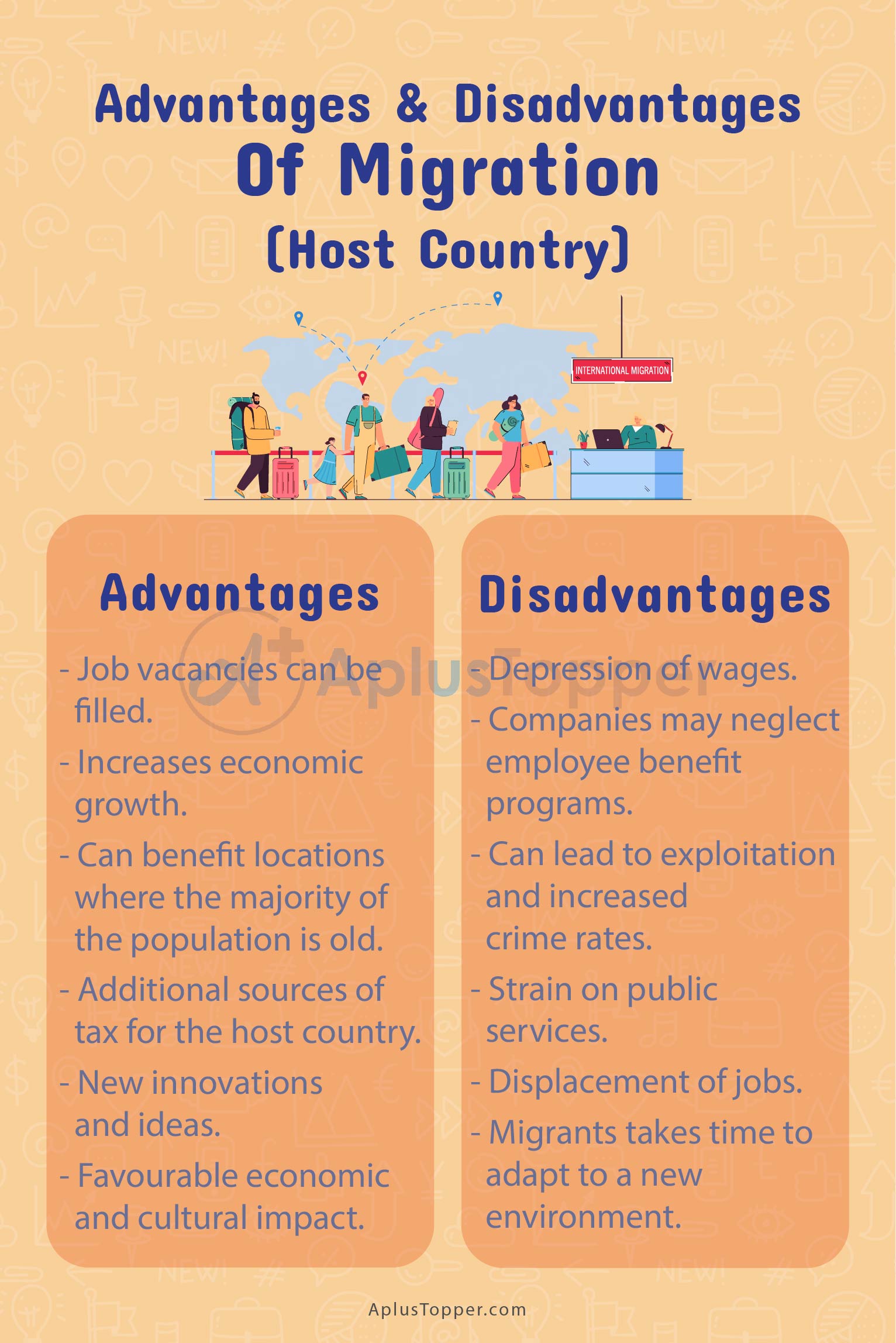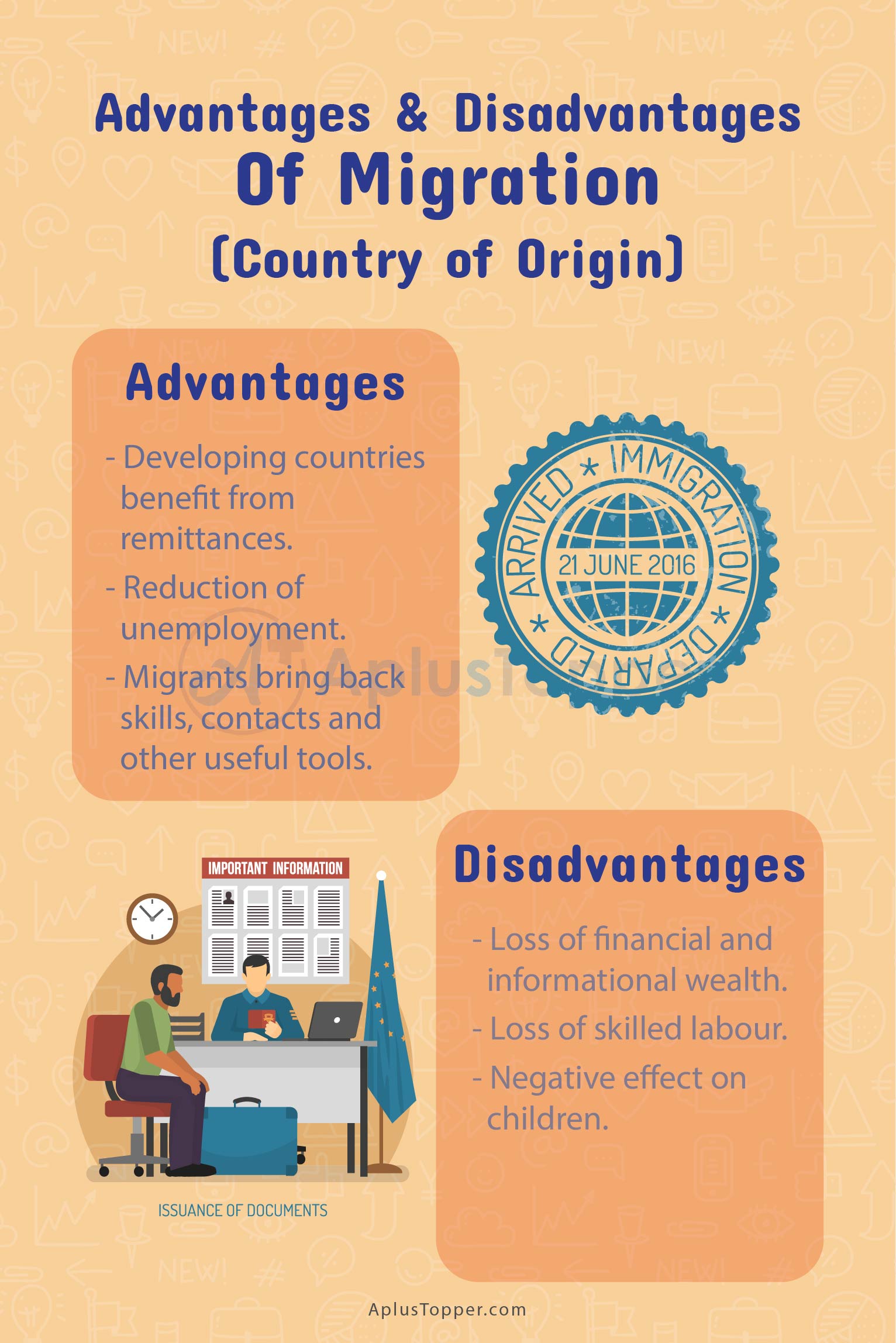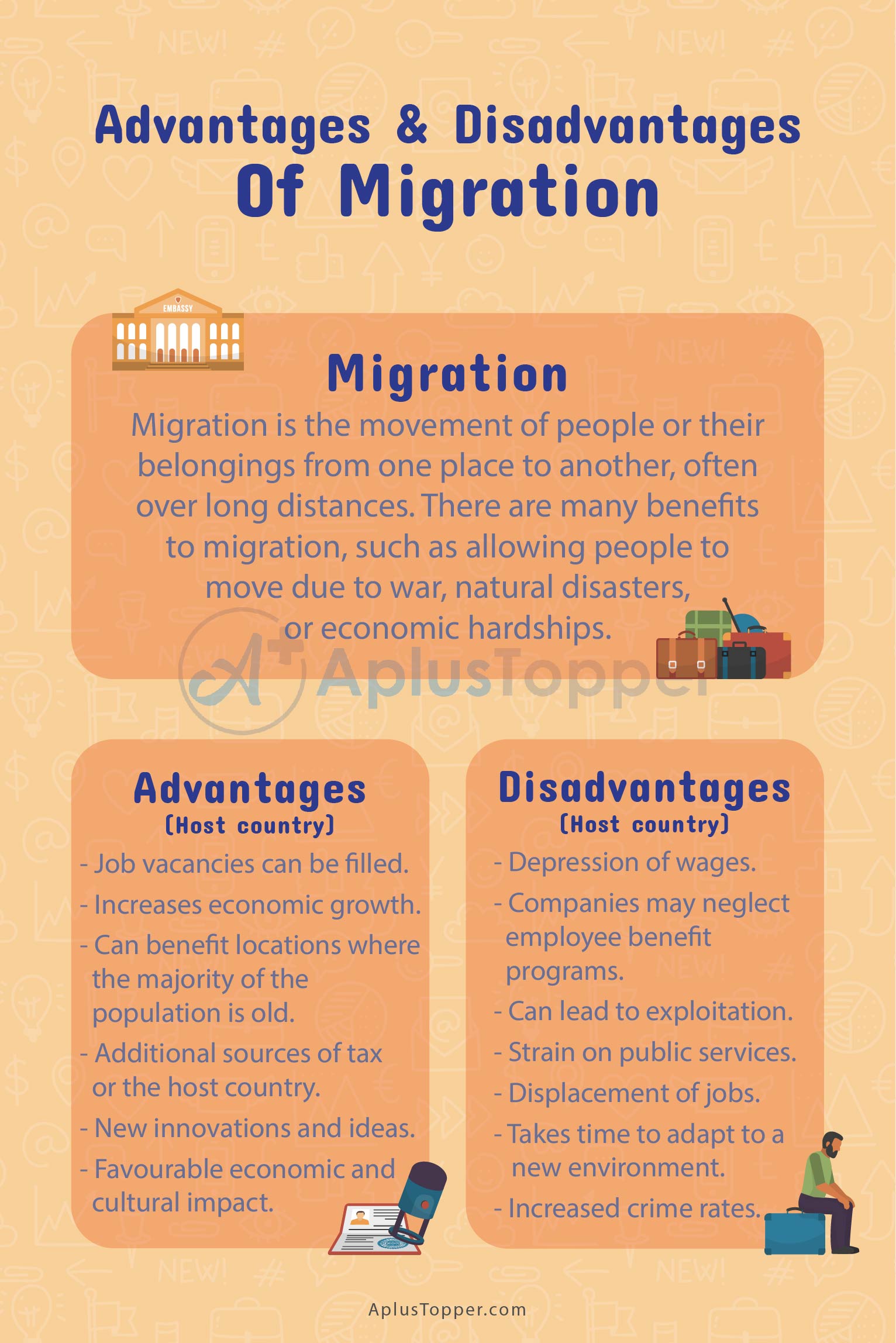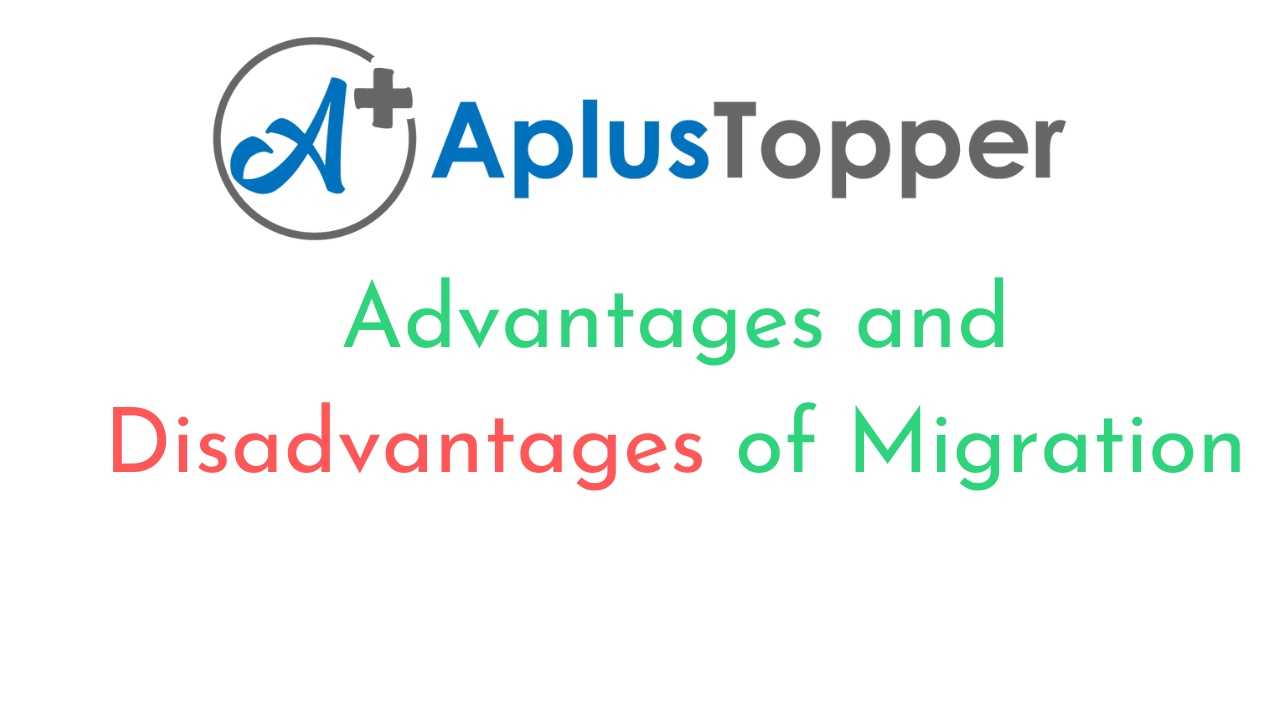Migration Advantages And Disadvantages: Migration is the movement of people or their belongings from one place to another, often over long distances. There are many benefits to migration, such as allowing people to move due to war, natural disasters, or economic hardships. Furthermore, there are also some challenges to migration, such as displacement of native communities and loss of culture.
For instance, a lot of people have been migrating to the United States over the last few decades, and most of them have chosen to settle down in new cities or communities. Some people might think that migration is a good choice because it could lead to more opportunities.
Students can also find more Advantages and Disadvantages articles on events, persons, sports, technology, and many more.
However, there are many disadvantages to migrating – with the biggest one being the language barrier. If you don’t know how to read or speak English, it will be hard for you to find a job in the United States. Regardless, migrating is a hard thing to do. It can be extremely difficult and stressful. Nevertheless, there are many ways to make your migration easier and more successful. If you plan carefully, you will be able to move smoothly through the process with minimal stress. In this article, we shall explore the advantages and disadvantages of migration, and some tips to ensure migration happens smoothly.
- Advantages of Migration (for Host Country)
- Disadvantages of Migration (for Host Country)
- Advantages of Migration (for Country of Origin)
- Disadvantages of Migration (for Country of Origin)
- Comparison Table for Advantages and Disadvantages of Migration
- Conclusion on Migration Advantages And Disadvantages
- FAQ’s on Migration Advantages And Disadvantages
Advantages of Migration (for Host Country)
Following are a few advantages of Migration for host country:
- Job vacancies can be filled – Migration can have a number of benefits for the host country. It has the potential to fill job vacancies and develop skills gaps within the workforce, improve business productivity, and boost national productivity.
- Increases economic growth – The economic benefits of migration to the host country of low-skilled labourers often outweighs the risks and cost to the host. In some cases, it can even be said that immigrants are a vital part of the cultural fabric of many countries.
- Can benefit locations where the majority of the population is old – When an economy begins to stagnate, fewer young people move into the area. This has a significant detrimental impact on services like healthcare and education that rely on a stable population. One solution is for migrants to migrate from their country of origin to the host country. As they are younger, they bring with them new ideas and skills that can help invigorate the economy.
- Additional sources of tax for the host country – Some countries are experiencing a demographic crisis as the number of people in the country shrinks and the number of people able to work shrinks. However, this population decline can be used to their advantage by accepting immigrants from other countries. The pension gap can be filled by the contributions of new young workers and they also pay taxes.
- New innovations and ideas – Researchers who have studied immigrants in the United States say that their presence has resulted in a positive impact on society. They contribute to economic growth and make up for some of the skills that the native-born population lacks. Immigrants are also thought to be bringing new ideas and innovations, which is important since so many of today’s jobs require specialised knowledge. Many companies instead of hiring American workers would prefer to hire foreign-born individuals because they can be hired more quickly and offer more value than their local counterparts.
- Favourable economic and cultural impact – In terms of economic development, migration has been shown to have a long-term positive impact. This is because immigrants bring skills and knowledge that may not be easily obtained or duplicated in the local population. In terms of cultural diversity, migrants contribute much to their countries’ social fabric and identity as they integrate with other culture groups within their host country.
Disadvantages of Migration (for Host Country)
Following are a few advantages of Migration for host country:
- Depression of wages – One of the major disadvantages to migration can be too much competition for jobs. In some cases, those who migrate may need to take on a lower paying job than they had in their homeland to maintain their standard of living. Additionally, with more people migrating, there is an increased cost of goods and services, causing wages to decrease. This is true also when immigrants have a higher education level and are willing to work for less pay.
- Companies may neglect employee benefit programs – With globalisation and economic pressure on wages, more workers have been willing to move from their countries of origin. Yet, this has led to a decline in worker productivity and development as companies can get away with paying “low” wages because they are able to save money by using migrant workers.
- Can lead to exploitation – Migration can be dangerous and can have a negative impact on the economy. While some migrants are able to find a decent job and earn a living for themselves, others may end up being exploited in the process. It is important for migrants to protect their rights because they may be taken advantage of due to language barriers or by placing their trust in people who do not want them to succeed.
- Strain on public services – Increased population can put pressure on public services. The more people there are, the more towns and cities have to build as well as new residential areas, schools and hospitals to accommodate them. This creates a strain on the government and its budget.
- Displacement of jobs – The number of people immigrating into a country can have economic and social implications. If unending numbers of people are migrating into an area, then it can have detrimental consequences like the displacement of jobs, unemployment and limited access to resources. There are also drawbacks as well such as increased rates of crimes, health risks and climate change.
- Takes time to adapt to a new environment – Though it is possible to integrate and find acceptance within a limited time frame, there are still difficulties that come from this movement. Some of these challenges include language barriers, threats of terrorism and violence, health concerns, discrimination and racism.
- Increased crime rates – Organised crime and people trafficking can be facilitated by migration of people. The ease of movement can make it easy for organised criminals to transport drugs, weapons, and other illicit goods across borders.

Advantages of Migration (for Country of Origin)
Following are a few advantages of Migration for country of origin:
- Developing countries benefit from remittances – Every day, migrants send money to their family members in developing countries. These remittances are an important part of the economy in such countries and can be used for investment in infrastructure, healthcare, education and security.
- Reduction of unemployment – Migrating can have a positive impact on the country of origin. It can increase their economic stability, reduce unemployment, and improve their workforce’s productivity. In addition to that, young migrants can be seen as a source of innovation and talent.
- Migrants bring back skills, contacts and other useful tools – Migration not only leads to social and economic benefits for host countries, but for countries of origin as well. Millions of migrants left their home countries and settled in another country, mostly a Western one. They usually return with savings, useful skills and contacts which help to drive economic growth, boost competitiveness and increase innovation for their country of origin.
Disadvantages of Migration (for Country of Origin)
Following are a few disadvantages of Migration for country of origin:
- Loss of financial and informational wealth – When countries are experiencing high levels of migration, the young population of that country (country of origin) will not be able to provide their previous level of economic contributions. This can result in a significant loss of wealth to the country as a whole.
- Loss of skilled labour – One of the negative impacts that migration has is the loss of qualified human resources in countries of origin. For example, when doctors migrate, there is a shortage of physicians in the country they leave. With high levels of depression, unemployment, and other health risks, these people are less likely to return to their home countries.
- Negative effect on children – When people migrate, they usually leave family members behind. This can lead to children growing up without a wider family circle that provides emotional and material support. The social problems that migrants experience in their destination country could also have a negative impact on the country of origin, leaving orphans or vulnerable children without parents.

Comparison Table for Advantages and Disadvantages of Migration
Following are the advantages and disadvantages of Migration.
| Advantages | Disadvantages |
| Job vacancies can be filled | Depression of wages |
| Increases economic growth | Companies may neglect employee benefit programs |
| Can benefit locations where the majority of the population is old | Can lead to exploitation and increased crime rates |
| Additional sources of tax for the host country | Strain on public services |
| New innovations and ideas | Displacement of jobs |
| Favourable economic and cultural impact | Migrants takes time to adapt to a new environment |
Migration Advantages and Disadvantages (country of origin) | |
| Advantages | Disadvantages |
| Developing countries benefit from remittances | Loss of financial and informational wealth |
| Reduction of unemployment | Loss of skilled labour |
| Migrants bring back skills, contacts and other useful tools | Negative effect on children |

Conclusion on Migration Advantages And Disadvantages
Migrating can be a beneficial option for many people. However, it’s important to evaluate the pros and cons of the decision before you migrate. Besides economic reasons, there are many reasons why people want to migrate. Sometimes, it is because their values are different from their previous environment or the need to move for diplomatic or political reasons. In conclusion, migration is a complex issue with many different factors. The most important thing that we can do is to understand the advantages and disadvantages of migration as well as our own reasons for moving.
FAQ’s on Migration Advantages And Disadvantages
Question 1.
What is Migration?
Answer:
Moving around is a normal part of life. People migrate to find new opportunities and new places they want to live in. We’ve all heard the phrase, “the grass is greener on the other side” which refers to how people often think that somewhere else will be better than their current situation. Many times, this idea comes true as people move to places where they can find better jobs, better schools, and more social support systems.
Question 2.
What are the advantages and disadvantages of Migration?
Answer:
Migration is a type of movement that takes place from one country to another. It can also happen between different regions in the same country. The advantages of migration include increased economic opportunities, cultural enrichment, and reduced environmental impact. On the other hand, there are disadvantages of migration including the risk of exploitation by employers or human smugglers, loss of cultural identity, and limited access to resources such as healthcare and education.
Question 3.
Is migration a good thing?
Answer:
Migration can be a great thing, but it can also be a very difficult thing. There are many advantages and disadvantages to migration in general. Migration allows people to travel, make friends, or even improve their lifestyle. However, migrants have often experienced prejudice because they are seen as “different.” Migrants also experience discrimination based on their religion, political views, and the region they originally came from.
